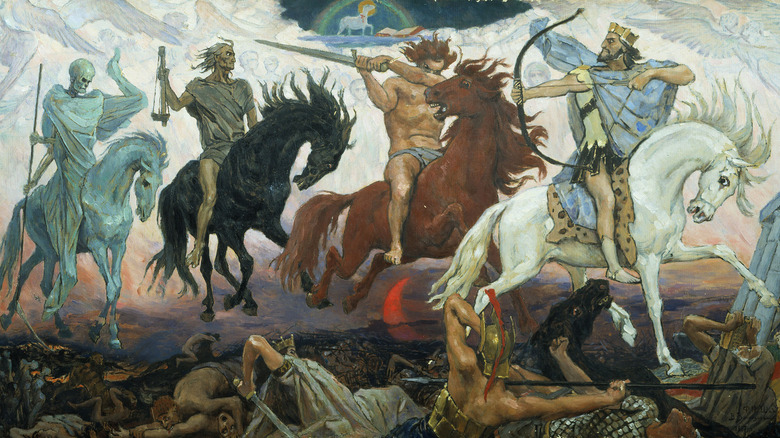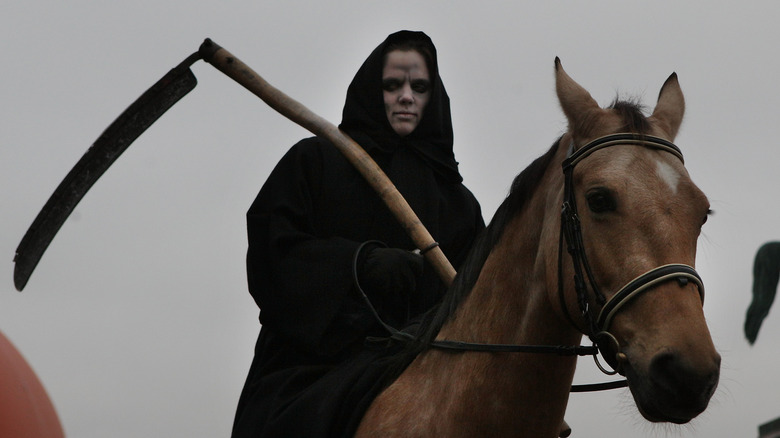The Horseman Of The Apocalypse Whose Name Changes Constantly
The four biblical horsemen of the apocalypse spell doom for existence. They and their iconic steeds have been referenced in Renaissance-era artwork, literature like Vicente Blasco Ibáñez's "The Four Horsemen of the Apocalypse," the "Darksiders" video game series, comic books, anime, tabletop RPGs, and much more. Suffice it to say: If any of us ever see a white, red, black, and pale horse racing across the horizon with deathly figures on their backs, well ... time's up.
With so many renditions of the horsemen milling around in our shared culture, it's easy to lose sight of the OG horsemen portrayed in the Bible's final book of prophetic and terrifying calamity, the Book of Revelation. Described in Chapter 6, Verses 1-8, the horsemen occupy an important place in Revelation's narrative, are memorable, vivid characters, and have received a lot of attention over the centuries.
Most critically, the four horsemen open the first four of the seven seals of the apocalypse and are generally considered symbolic representations of global events. The horsemen's roles often get reduced to simple monikers: Conquest, War, Famine, and Death. War, Famine, and Death have remained pretty constant over time, but Conquest is sometimes rendered as Pestilence. Ultimately, the difference boils down to biblical translation and textual interpretation. Certain translations might say the word "conquest," but the horseman's role might not be so clear-cut.
[Featured image by Viktor Vasnetsov via Wikimedia Commons | Cropped and scaled]
War, Famine, Death, and ... ?
Everything from Christian websites like Thoughts on Christ and Clearly Reformed to Reddit threads and message boards like Straight Dope have asked about naming conventions for the Four Horsemen of the Apocalypse. Answers vary, to say the least. Sites like Beyond Today and Tuna, for instance, say that it's the fourth horseman, Death, that should be associated with pestilence and plague, not the first horseman, aka Conquest. Sites like the Metropolitan Museum of Art note that German artist Albrecht Dürer drafted his well-known four horsemen woodcut as Pestilence, War, Famine, and Death way back in 1498 C.E. Meanwhile, in yet another Reddit thread folks speculate that Conquest is too similar to War, and therefore we sub out Conquest for Pestilence.
Ultimately, no matter the translation of the Bible (and there are lots), "Death" is the only named horseman. The other horsemen get their names based on what they do during the apocalypse. The first horseman rides a white horse, has a bow and crown, and goes around conquering — that's Conquest, or Pestilence. The second horseman rides a red horse, has a sword, and takes peace from Earth — that's War. The third horseman rides a black horse, has a pair of scales, and is connected to overpriced food — that's Famine. The fourth horseman rides a pale horse and brings hunger, death, and "beasts" — that's Death. We could call these horsemen anything we want, but it wouldn't change their roles or actions.
Different translations, different interpretations
On top of all the aforementioned opinions about the four horsemen and their names, we should remember that each and every section of the Bible — including the Book of Revelation — can be translated and interpreted in different ways. The Bible wasn't written in English, after all, but in Aramaic, Hebrew, and Greek. Furthermore, Precept Austin says that Revelations was written in a much more "primitive" Greek than other biblical books and contains loads of grammatical errors. This is why many people don't think it was written by the same John who wrote the Gospel of John. PBS says that an early Christian called "John the Elder" likely wrote Revelation around 96 C.E., though there's no way to be sure.
Calling the first horseman "Conquest" might come from translations that use the recognizable English word, "conquest." The New International Version says, "Its rider held a bow, and he was given a crown, and he rode out as a conqueror bent on conquest." The Common English Bible, on the other hand, reads, "Its rider held a bow and was given a crown. And he went forth from victory to victory." Young's Literal Translation says that the horseman "is having a bow, and there was given to him a crown, and he went forth overcoming, and that he may overcome." So which is correct: conquest, victory, or overcoming? The words are related, but not perfect synonyms. The real answer, though? They're all correct.
From Conquest to Pestilence
At this point you might be wondering: Even taking different biblical translations into account, and the world "conquest" popping here and there in translation, how is it that "conquest" could ever become "pestilence"? In defense of referring to the first horseman as "Conquest," The Gospel Coalition says that the horseman's bow was a standard symbol of military power, and the white color somehow represents military conquest. The other horsemen and their horses' colors follow from military violence, in order: red for blood, black for famine, and then pale for death, like a corpse. This makes sense, but again, it's just one interpretation.
Out of all the backs-and-forths online and the multitude of sources chiming in on the topic, the site Social Studies might help explain the shift to pestilence. Pestilence, like the other horsemen — War, Famine, and Death — has always been a fear hanging over humanity's head. The Black Death that struck Europe from 1347 to 1352, for instance, killed between 25 and 30 million people and between 30% and 50% of the populations of those areas that it struck. While we can't pinpoint the shift from "Conquest" to "Pestilence" as starting with The Black Death, it makes sense that post-Black Death, people might have pestilence on the mind. Fast forward 150 years or so and we see artists like Albrecht Dürer cite Pestilence, War, Famine, and Death as the four horsemen. We can't say for sure, but it's a possibility.



